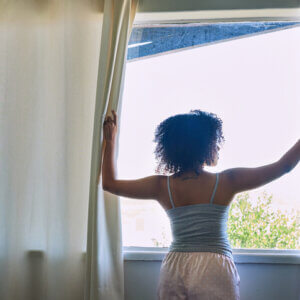 Special Guest: Dr Kara Mohr
Special Guest: Dr Kara Mohr
If you’ve ever spent a night in a hotel room, tossing and turning, staring repeatedly at the clock, simply to learn that it is 15 minutes later than you last looked, you understand how hard travel can be on your body and your sleep. As a well-being expert, I’ve worked hard to minimize disruptions to my sleep schedule, including maintaining a bedtime ritual no matter where I am in the world (change into pajamas, wash face and brush teeth, write in my gratitude journal). I also try to go to bed at the same time and wake up at the same time every day. Of course, that doesn’t always “fly” when you’re traveling – thanks to airline delays and changes in time zones. In times like these, you need to take a more intensive approach.
These are the three things I’ve found that help the most:
Noise-canceling earbuds: Being able to block out external sounds is helpful to falling and staying asleep. I’ve tried sound machines to drown out strange or disruptive noises, but I have never had the same quality of sleep as I do when I’m not forced to use them. Consistent white noise can help, yes; however, it’s always still felt like noise to me. Enter noise canceling earbuds. My favorite pair is made by Bose, but many different brands exist. They are comfortable and block out all sound (including my snoring spouse when I am in town – I’m sure many can relate). The fit is snug, comfortable, and don’t fall out if you are a restless sleeper. The best part, according to my sleep tracker: my deep sleep has tripled since wearing them.
A 10-minute walk at dawn and dusk: Your body wants to move with the sun. For this reason, when you’re in a time zone that is significantly different than your normal time for waking and sleeping (> 3 hours), this tip can help you regulate your circadian rhythm more quickly and sleep better. Simply take a 10-minute walk outside within an hour of waking, and again in the evening before bed. Morning sunlight exposure also helps with wakefulness and gives greater amounts of energy; particularly useful at a time when your body may be accustomed to sleeping. Exposure to the changing light at dusk helps your brain release melatonin earlier, letting you fall asleep more quickly. Plus, those extra steps will just feel good!
Removing alcohol: I love a great glass of wine, especially in social situations or at the end of a full day. However, the long and short of it is that alcohol disrupts sleep. Not only do you spend more time in light sleep, shortening deep sleep and REM cycles, but you’ll also wake more frequently. When I’m struggling to get the quality rest I need, alcohol is the first on the chopping block. While that may not be the answer you were hoping for, if you’re looking to feel refreshed and energized from a higher quality sleep, it should certainly be something to strongly consider.
To maximize energy, well-being, and recovery, sleep should come first. When work, travel, or personal commitments are getting the better of you, consider trying these and other sleep hygiene practices. Of course, no practice works once. It’s the commitment to prioritizing your own health and well-being by making good quality rest a non-negotiable that will make all the difference, no matter what time zone you’re in.
 About the Author
About the Author
Kara is a Signature Leaders faculty member.
Kara Mohr, PhD, FACSM is an internationally recognized dynamic keynote speaker who is known for her expertise and experience in the areas of mindset, resilience, strategies for physical, emotional, and mental well-being and behavior change. For more than 25 years, Kara has been using her warm and engaging style to inspire teams and individuals to transform their understanding of personal energy and well-being.
Kara is co-founder of Mohr Results, Inc., a well-being company that focuses on well-being content creation and facilitation to help people & organizations create healthy, thriving cultures that value well-being, relationships, the human experience, and performance.
Head to Mohr Results to see more about Kara.
